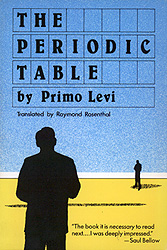
In 1975 Primo Levi published 'The Periodic Table'. Made up of twenty-one chapters, each one titled with the name of a chemical element, it is autobiographical in nature, like many of Levi's books. However, wheras Levi's other autobiographical works focus on his ordeal in Auschwitz, 'The Periodic Table' covers the whole scope of of his life, from his family's origins ('Argon') to his professional life as a chemist after the war. Each chapter stands on its own and the book works as a collection of short stories, although the order is chronological.

'The Periodic Table' gives an insight into the importance of chemistry in Levi's life. On a very basic level it probably saved him at Auschwitz, where his professional experience meant he was selected for work in one of the IG Farben synthetic rubber factories attatched to the concentration camp ('Cerium') - far preferable to the back-breaking physical labour he would otherwise have had to perform. Chemistry also provided Levi with a living before and after the war.
But Levi looked for more than simply 'the tools to earn his living and have a secure life.' In 'Hydrogen' Levi expresses what chemistry meant to him as a school boy: 'An indefinite cloud of future potentialities'...from which 'cloud I expected my law, the principle of order in me, around me and in the world.' In 'Iron', as a chemistry degree student and with the war looming with all the terrible consequences that it would have for him, Levi explains to his friend Sandro how his view of chemistry has developed:
Sandro was surprised when I tried to explain to him some of the ideas that at the time I was confusedly cultivating. That the nobility of man, acquired in a hundred centuries of trial and error, lay in making himself the conquerer of matter, and that I had enrolled in chemistry because I wanted to remain faithful to this nobility. That conquering matter is to understand it, and understanding matter is necessary to understanding the universe and ourselves: and that therefore Mendeleev's Periodic Table, which just during those weeks we were laboriously learning to unravel, was poetry, loftier and more solemn than all the poetry we had swallowed down in liceo; and come to think of it, it even rhymed! That if one looked for the bridge, the missing link, between the world of words and the world of things, one did not have to look far: It was there, in our Autenrieth, in our smoke-filled labs and in our future trade.
In the dark climate of fascist rule chemistry even acquired a political importance for Levi as an 'antidote to fascism...clear and distinct and verifiable at every step.'
Chemistry was of genuine spiritual importance to Levi . His fascination is evident in other chapters of 'The Periodic Table' such as 'Carbon', one of two short stories written as a young man, rediscovered, and included in the book. It tells the story of a single carbon atom through millenia as part of a layer of sedimentary rock, through dissolution in the ocean and through lightening organic reactions.
Of even greater interest to Levi was the practice of chemistry. 'The Periodic Table' is littered with various practical procedures described with great respect and profound wonder. This description of the distillation process from 'Potassium' is a case in point.
Distilling is beautiful. First of all, because it is a slow, philosophic, and silent occupation, which keeps you busy but gives you time to think of other things, somewhat like riding a bike. Then, because it involves a metamorphosis from liquid to vapour (invisible), and from this once again to liquid; but in this double journey. up and down, purity is attained, an ambiguous and fascinating condition, which starts with chemistry and goes very far. And finally, when you set about distilling, you acquire the consciousness of repeating a ritual consecrated by the centuries...
Not only was chemistry vital in the life of Primo Levi, but Primo Levi is of some importance to chemistry; at least in my view. He infuses wonder into both its substance and practice. His standpoint as an ordinary chemist is important: greatness is a fixation of our time and culture; there are so many celebrated people in the world it may seem some level of recognition is expected. Levi not only articulates a love of chemistry for itself but puts across his keen sense of the nobility of the chemist's trade. This transcends ambition but not ego. Levi's pride in his profession can be seen in 'Lead' which tells the story of a much earlier - but crucially historically anonymous - chemist: a man who travels throughout ancient Europe trading on his knowledge of and expertise with lead. He has little understanding of his medium - the fact that all his lead-working ancestors died early of similar symptoms he takes to be an unfortunate family trait - but is intimate with it through long contact and proud of what he does.
Primo Levi's writing, and especially 'The Periodic Table', played, for good or ill, a large part in my pursuing a degree in chemistry. I hope that this webpage encourages other people to have a read of his books too.
All quotations taken from 'The Periodic Table', Primo Levi, Trans. Raymond Rosenthal, Michael Joseph Ltd., 1985.